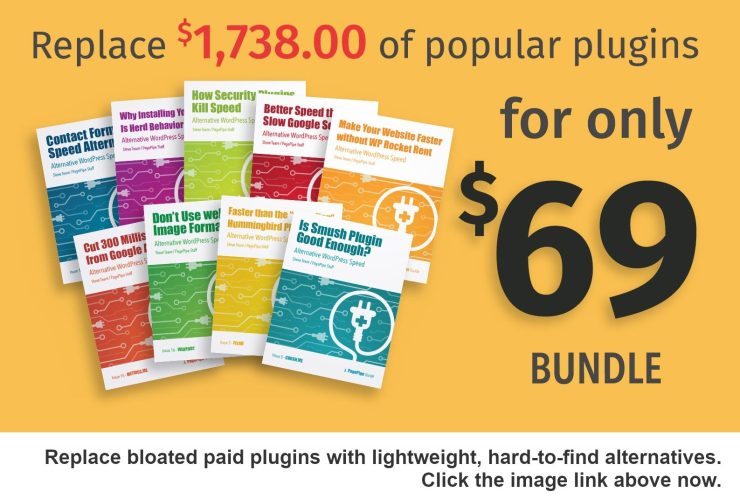This article explores page builder plugins – in particular, Elementor page builder. We examine inherent page speed hazards and fears. Speed problems aren’t Elementor’s fault. Undisciplined wannabee web designers are the big problem. Elementor Pro doubles Elementor (free) plugin site drag.
1Your page builder predictions seem apocalyptic and scary. Why so negative? Do you have a grudge against Elementor?
All page builders tempt inexperienced users to load up their pages with stuff that slows things down. Automattic’s goal is for Gutenberg block editor to kill all page builders within a few years. They are competing with drag-and-drop website builders like WIX, Squarespace, Weebly, and Shopify. Pagebuilder plugins will be collateral damage.
REFERENCE: Is Gutenberg faster loading than Elementor? Yes.
Pagebuilder efficiency encourages consumption of speed resources. It’s ironic rebound psychology called Jevons paradox.
REFERENCE: https://en.wikipedia.org/wiki/Jevons_paradox
Jevons paradox
1. Web design becomes more accessible to abusive novices.
2. Pagebuilder efficiency increases web speed consumption.
2Is this article authored by a jealous traditional web designer?
Here at PagePipe, we write free articles about creative methods to produce web-page speed. We also sell speed ebooks and services. We build speed websites for clients. We report what we learn. We have CSS and HTML coding skills. We prefer free theme and plugin alternatives for speed novices. We do not include any affiliate links or advertise third-party products on our site.
Speed is fundamental for good user experience. Metrics affected most by speed are dwell time, bounce rate and click through. These show user intent and engagement. That affects organic SEO.
3Are you looking at data from older Elementor sites? Is this information outdated or obsolete?
Because of this report’s popularity, we update it with new information. We currently have various test sites running Elementor (free) and Elementor Pro (paid). We track plugin updates. (Our original article appeared in fall of 2017).
4Does Elementor’s ability to change background images on mobile devices alter your opinion?
These device-sensitive features are not new. The November-2016-release of WordPress-authored Twenty-seventeen free default theme included them. It isn’t innovative technology. It’s common sense. It doesn’t differentiate Elementor.
5Does PagePipe use Elementor Pro?
Only on experimental sites. For business owners who need a page builder, we recommend Elementor. But we point out the benefits and potential dangers of adoption.
6Are under 2-second page loads possible with Elementor and GeneratePress on shared hosting?
With discipline and skill, yes. Say “no” to bloat.
7Are WordPress’ methods of reporting the number of active users flawed?
Yes, they are. But it’s all we have. Ask them to fix it, please.
We explain retention-rate calculations:
https://pagepipe.com/information-scent-deciphering-the-wordpress-plugin-repository/
Elementor is one of the more popular live page builders for WordPress. It has a free and paid version. Some claim it will change WordPress design. We bet the Gutenberg block editor changes the landscape more.
The Elementor plugin file weighs 5.7 megabytes compressed. And 21.5 megabytes decompressed in version 3.1.0. For comparison, WordPress core weighs 15.8 megabytes compressed (and 16.5 megabytes decompressed).
Elementor is now almost 5 megabytes heavier code when decompressed than the WordPress CMS platform it runs on. Ironic. And it’s still growing
Pagebuilder code functions slow down sites. Pagebuilder authors load variables from databases. This triggers many slowdowns. How much padding do you need? What color? Border or not? Round images or squares? etc. Configuration decisions and selections run in real time. These repeat the same redundant decisions on every page load.
1.2M of Elementor is Font Awesome. Why did they include that?

One of the bad things about many page builders is that they use shortcodes. Once you stop using the page builder plugin – for any reason – it messes everything up. Elementor (and Beaver Builder) don’t do that. Yes, some features of Elementor use shortcodes. But only a few, and those are optional features … not necessary.
★★★☠☠
Elementor Pagebuilder
Active installs: 5,000,000+
Zip download file: 2.3M 4.8M 5.3M (and ever growing).
Original package weight was 1.1M.
It’s not uncommon for a page builder to add CSS and JS code to every page on your website (site drag). The average Internet desktop page weight being 2.3M to 3M. Most heavier mobile pages we test are around 500k to 750k. Our home page is 909k. The page you are reading now is 263k. You can see that an average page builder could be much heavier – without any content!
Elementor has lots of features and is easy to use – especially for novices. We aren’t fans of page builders. In our experience when themes include page builders, there’s always bloat. Not from the page builder itself – but by the site owner adding unnecessary junk. Pagebuilders also have a learning curve. Much like learning a new computer operating system. Sometimes, page builders add as much as an extra 500k of CSS files – and 500k of Javascript files. That’s 1M of page-weight overhead. When questions came about how fast or slow Elementor is, we decided to test and satisfy our curiosity.
Want to read a good article that compares how the major page builders affect WordPress speed. We didn’t write it. We wish we did. Read it at Primary Image.
Page weight matters most on mobile. Weight consumes connection resources. Mobile’s a different beast than desktop connections. Desktop is all-you-can-eat connections. So, in most cases, a 20k-weight difference makes little impact in load time. Except on a remote smartphone. Then it does. And it costs extra money for each page. Why does 20k even matter for extreme mobile performance optimization? Isn’t that a puny file size?
Our typical page weight for mobile speeds are in the 100k to 200k range. 20k addition is 10- to 20-percent increase. That doesn’t necessarily translate into a 20-percent increase in speed reduction. But, it’s revolting for a speed freak to consider an addition to every single page of a site (site drag). Of course, there are worse plugins. The 20k comes from HTTP requests for CSS and Javascript files. It may be worse with more features added – but we only tested for a best-case scenario.
Elementor delays page load time very little on an average desktop site. Viewer expectation is a 2-second load time.
An average desktop page speed (8 seconds) is unacceptable for mobile – or anyone for that matter. Average page weight (2.3M to 3M) is especially unacceptable for mobile users. Why? Because mobile viewers expect pages to load just as fast as a desktop. Less than 2 seconds! That necessitates building a 1-second page for mobile to achieve a 2-second load time.
We’re talking about building a 1-second page speed on shared hosting that typically has a 300-millisecond Time-to-First-Byte (TTFB). That is the server overhead or server delay before the page starts to render on screen. You can’t remove or change this. You can only switch to a better (more costly) host. If our performance budget is 1 second, we now only have 700 milliseconds left to load all page assets. About half of the weight is usually images. The other half WordPress core, theme, plugins, and written content. Again, we say typical. There are many tricks like optimizing images. Or stripping webfonts. Etc.
So is adding 20k to every page bad for mobile speed? Under these conditions? Of course.
OFFSITE LINK: https://wpjohnny.com/why-i-hate-pagebuilders-wordpress-review/
Elementor plugin natively adds 41 milliseconds to every page load. A typical plugin only adds 1 or 2 milliseconds. A bad plugin adds 250 milliseconds or more. It’s hidden in the HMTL (PHP), not Javascript. Is that bad? It depends on how much you need to squeeze your site.
Posts created with Elementor may have 400k of page weight overhead from scripts.
How much difference Elementor makes to speed and page weight is one of those, “It depends” answers.
In general, from tests, it doesn’t add any more than 40 to 75 milliseconds to global page load time. Using the premium plugin doubles the weight.
Elementor adds site drag. Plus it enqueues Javascript. This isn’t good news for mobile. Elementor negates some speed benefits of fast themes like GeneratePress or Twenty-seventeen default. Of course, most developers are unaware or apathetic to these problems.
Now with that said, Elementor only activates on pages requiring their customization. This is elegance in the name of speed. For example, we doubt blog pages require any customization.
If Elementor isn’t used on a page, the plugin isn’t activated. And jQuery isn’t enqueued either. This is miraculous good news. It means use Elementor only where necessary, not on every page. Plugins like Contact Form 7 activate jQuery everywhere. That’s the ugly norm. Elementor is smart. Plus you can use Elementor’s form builder instead of Contact Form 7.
Delivering icons as a font is a hack.
Author: Tyler Sticka
We don’t recommend page builders in general – even good ones. Why? Because site owners easily abuse them and make heavy pages. They can’t overcome the temptation to embellish. We feel page builders encourage negative UX behavior. It’s expressive design overkill. It’s like handing an open bottle of poison to an infant. They can’t resist – the site owner drinks it. Thus the skull-and-crossbones in the rating.
It looks like Elementor adds 4 or more HTTP requests. Minor. The downside to using Elementor is small for desktop sites – other than the learning curve.
We see page builders as a stopgap. Only because the best version of WordPress will be built in the future.
Good Offsite Link: https://pippinsplugins.com/wordpress-page-builder-plugins-critical-review/
The page builder ecosystem is a wild west right now and is in a gold rush. – Pippin Williamson
WordPress keeps incorporating features that make whole categories of plugins obsolete in a single day. This trend will continue. Automattic watches what’s emerging in the plugin directory. They’re not stupid. We don’t agree with this competitive business strategy. But the big fish will feign innovation by continuing to eat the little fish – either by acquisition or reverse-engineering. Gutenberg block editor intends to consume little fish.
The only detriment to using Elementor is 40-millisecond site drag added to every page of your site. And enqueuing jQuery by accident can negate gains on fast themes built specifically for mobile use. That’s low by comparison to say Yoast SEO Pro 240 millisecond bloat – and Contact Form 7 adds up to 50 milliseconds. Those are popular plugins. Popular usually means heavy and slow. A “nice” plugin loads in 1 millisecond. Is Elementor becoming a popular plugin? Yes. For us, that’s a bad sign. Yes, a plugin can be popular and bad. This is typical of popular caching plugins, too. Test and toss.
For extreme mobile performance optimization, we remove everything possible to reduce site drag.
But Elementor plugin uses selective activation. In other words, if a page isn’t built with Elementor, the plugin is not loaded. This is not typical, usually, plugins will load globally on every page and post whether they’re needed or not. This we call “site drag.”
So the goal is only to use Elementor on those pages where it’s absolutely needed for customization. This will reduce the number of HTTP requests (calls) significantly. For example, usually blog pages don’t require customization but a home page might use a lot of customization.
But we wonder, could a custom home page or catalog page be constructed with a responsive column plugin? One like Lightweight Grid Columns by Tom Usborne of GeneratePress theme fame (22k package size download).
Elementor plays nice because of selective activation.
We never want to invest in the Elementor learning curve – or any other page builder or builder theme. We see them as vulnerable. It has nothing to do with speed.
Dissolution of 5,000,000 Elementor sites is collateral damage for WordPress.
Why would WordPress incur that bad-PR and offensive risk? Read on.
Pagebuilder weakness isn’t about speed.
Even if Elementor plugin doubles the theme page weight. Does that matter? No. Why? Because heavy plugins like WooCommerce swamp potential small gains fiddling with Elementor alternatives.
80/20 rule. Pareto’s Principle.

We’ve assessed what it costs in time and money to get rid of Elementor on a site. It isn’t worth it. Elementor is a benign *growth*. No speed plugin surgery needed. Other problems with speed are much bigger and more toxic. Elementor is puny and not even worth scratching like a speed itch. It causes us no pain to ignore it.
NOTE: Elementor is only used on pages where it is activated. So that minimizes the need.
We could care less about Elementor. It’s not a tool we want to use. It’s fine if you use it to get web skills you need. It’s OK. No guilt.
We will and do touch Elementor on existing client websites. We never remove it – nor would we want to. What a mess that would be.
We recommended Elementor to a site owner in Germany. He had 5-second load times. He actually made the difficult switch from Divi theme to GeneratePress + Elementor combination. His load time was then around 1-second to London using the same host. Nice!
We recommend Elementor page builder – but we wouldn’t build with any page builder. This guy in Germany couldn’t code any customization. He needed a page builder. Our recommendation was Elementor. We don’t hate Elementor.
“I hired several WordPress ‘speed experts’ before. All failed to achieve decent results. Steve is an expert in his field. His advice helped me understand what was slowing my website down and fix it permanently. My site used to take 5 to 7 seconds to load – and after Steve worked his magic – it now loads in less than 1 second. Thank you!” supboardguide.com Hamburg, Germany
Another big point is: The slow release of Gutenberg phases retards page builder adoption.
Our speculation is not the demise of only Elementor. It’s the future demise of any WordPress Gutenberg block-editor lookalikes, copycats, or even simulators. Gutenberg doesn’t equal Elementor today. But it will in the future – that’s WordPress’ express goal. Not ending Elementor, they’re small potatoes. But nuking WIX, Shopify, and SquareSpace.
This is the answer to why WordPress will burn Elementor: MARKET DOMINATION. They want more. They want to take back the piece of pie WIX, Weebly, Shopify and SquareSpace took from them.
This narcissistic strategy hurts all page builder plugins and themes. Casualties.
People are discovering Gutenberg block editor is faster. Then we’ll all see what real WordPress landscape changes occur. That won’t happen until complete Gutenberg block-editor is finally released after a few phases. Face it, it’s a big undertaking. It could be a couple more years. Gag!
Gutenberg competition will be a spin-doctor excuse to drop non-profitable loser products. Divi theme, please!
People argue semantics about what is a *true* page builder. Like BeaverBuilder or Elementor or Divi. They think in error the two universes of Gutenberg and page builders are apart. Barely related at all. Wouldn’t that be dainty?
Pagebuilders are bad because human beings can’t control themselves and are seduced into adding too much. That’s bad for speed. This isn’t Elementor’s fault. It’s the result of human frailty.
From Gutenberg plugin page:
“Gutenberg has three planned stages. The first, aimed for inclusion in WordPress 5.0, focuses on the post editing experience and the implementation of blocks. This initial phase focuses on a content-first approach. …
These foundational elements will pave the way for stages two and three, planned for the next year, to go beyond the post into page templates and ultimately, full site customization.”
Full-site suck-o-mization? Do they mean a page builder killer? Yep.
There is no proven or verified SEO benefit from using Elementor.
There isn’t even a whisper it’s good for SEO. If so, it’s a myth or ploy.
The vaporous claim is Elementor produces “cleaner content” – and search engines will like that. Really? So we don’t have to write content anymore? Claiming “cleaner content” is insignificant. A flea on the back of an elephant.
“In SEO, [fanatics] create uber-optimized websites, ending up with a butt ugly design, and spending all their time optimizing and coding instead of creating content and doing marketing.” – Brian Jackson
REFERENCE: https://woorkup.com/elementor-page-builder/
SEO is most affected by relevant content – not silly SEO trickery. If the site content is a failure (unwanted or unneeded), no amount of SEO tweaking will save a site. Ever.
And especially not Elementor. Ridiculous claim.
By Google’s own admission – WordPress core does 90 percent of the heavy lifting for SEO compliance. No need for an SEO expert. Important SEO ranking factors are beyond the control of site owners – and Elementor. Except for producing good relevant content. Owners can do that. Tweaking keyword and snippets only get you in trouble.
Content is the user experience. Good user experience causes good SEO. Return visits, reduced bounce rate, more clickthru, longer dwell time. Speed is the number one hurdle to good user experience and first impression.
Anyone who insists Elementor is a superior SEO tool is a bully.
If a client insists on tool choices, you’re no longer a freelance subcontractor. Now, you’re an EMPLOYEE. That changes the payer’s tax liability.
We’re using Elementor on some sites because we want to try it out. It’s an experiment. Insane curiosity. But Elementor is proving frustrating. The more we learn and work with it, the more we find it getting in the way. We’re starting to dislike Elementor when it buries simple customization three layers deep. That makes it difficult to verify changes. Repeating steps over and over to get results is unproductive. We don’t have time to fiddle with such nonsense.
The goal is efficiency. Elementor does NOT improve design efficiency. You’d do better buying a used second computer screen so you can do drag-and-drop of media files. Elementor is a barrier and limiting factor to creative flexibility. The uninitiated think Elementor sets designers free. Wrong! It’s handcuffing for the intelligent.
Don’t let client insistence shove Elementor down your throat. Learn it if you want. But our experience is Elementor is unneeded and slows down sites – and development time. It’s a crutch for the lazy. But then one could say that about any plugin or theme, too.
Any tool claiming to do “anything and everything” should be instantly suspect. Just like SEO claims and promises. Theoretical unproven benefits.
A quick summary of why Elementor is not “risk-free”:
1
It seduces you into adding features you don’t need. This causes site clutter. Visual noise. Elementor doesn’t magically give design skill or savvy. Or discipline.
2It’s a time waster. You hunt how to do things you did before on subconscious autopilot (like colorizing text). Simple decision-making becomes complex. It’s supposed to be easier. For us, it’s not. We end up talking more about Elementor alternatives. If we were design virgins, we’d think Elementor the greatest – or even the best. It’s disappointing for experienced designers. The delight factor is feeble.
3Elementor keeps getting more and more convoluted. It’s in constant change as they update features. Complication increases technical fragility and learning curve. They can’t stop adding junk. Their gold-rush panic and feature obsession make us have to think.
4Elementor has a short shelf-life. WordPress (Matt Mullenweg) has no qualms admitting page builders are obsolete collateral damage. When Gutenberg block-editor reaches stage 3, it’s a done deal. Their intent is replacing all page builders. Will Gutenberg be faster? Yes. Will it be better? We don’t think so. All page builders are a bane for intelligent designers. It’s a substitute decision-maker for web-design weaklings. Most of our sites have “Disable Gutenberg” or “Classic Editor” plugin installed.
REFERENCE: https://gutenberghub.com/gutenberg-vs-elementor-html-bloat/
5
There is no SEO benefit – and no speed benefit – and no usability benefit.
“The home page has to load in 2 seconds, product pages in 2.5 seconds and all other pages in 3 seconds.” – Brian Jackson
REFERENCE: https://woorkup.com/elementor-page-builder/
6The authors of Elementor are in a Parana-fish state of mind. They’re working themselves compulsively into potential collapse from frenzied burnout. Out of control growth. They wrongly believe quantity translates into quality. It never does.
7Elementor loads unneeded CSS and JS or code in general that is not in use. They need to add global control to enable/disable widgets/elements. This is dequeuing. Then if we never use a widget, we can disable it. This feature does not exist yet making Elementor inefficient. Doing this automatically rather than disabling widgets manually would be even better. A large percentage of the CSS loaded is unused, heavy, and impacts mobile page size and performance.
Are we using Elementor? Yes. On test sites. Why? So we can answer questions about “How good is it?” Do we recommend it? No. Avoid it if you can. If you don’t have design chops, then accept you’ll rebuild the site within a few years. Go ahead. Admit you’re defeated as a web designer. Are you getting a productivity tool – or complicating your life?
“I’m working with an SEO guy and he’s kind of insisting I install and use Elementor. Which means a learning curve for me …
… I can build a site much quicker myself. … All he wants it for is something to do with his conversions and adwords” – a Scottish developer
The more we use Elementor the more we don’t like it. That’s because we write CSS code for customization. Elementor gets in the way and slows us down. But others who are non-coders think Elementor is the coolest thing since sliced bread.
Elementor isn’t simpler or faster to use for us. Elementor buries simple edits down layers of screen changes. Then we have to click back up through the layers. We’ve come to hate the process.
@michaelnorthern , yes unfortunately Elementor is becoming bloated. They implement half-baked features and then leave them without polishing only to be able to state that they have that feature. This trend has been going very long time. I was banned from the FB group for critiquing them for their focus on marketing/selling more than on fixing important issues and improving the core.
And now with competition like Brizzy and Oxygen they will have more and more abandonment.
Elementor is an anti-productivity tool for us – a waste of resources and time.
Our feeling is the Elementor authors are doomed. Destined to burnout. Their kingdom gets fragile as it grows in complexity. Third-party addon plugins for Elementor are hack jobs by opportunists. We’re not impressed with the community. There’s a churning of updates on Elementor plugin – and lots of arguments and debating on forums. This chaos isn’t a good indicator of longevity.
Elementor is a crutch. On a simple blog rebuild, we didn’t need Elementor and could keep things simple. Building felt like silk. Elementor makes a mind trip on the lumps. Elementor is seductive to WordPress novices. Once site owners get bitten by Elementor, they forget about reducing speed overhead. “Oh! Look we can use Elementor. Goodie! Then I won’t have to think.” Strategy is what creates faster websites.
Will we continue to work on Elementor sites? Yes. We also work on WooCommerce plugin sites. Woo is heavier than any other free plugin we’ve encountered to date.
Design is a compromise.
A lame plugin called “WP YouTube Lyte” came out in March of 2018. Other lazy-loading video plugin alternatives are better and don’t need an API.
LYTE by default uses WordPress “the_content”-filter. Pagebuilders (Elementor) don’t apply that filter to their content. So LYTE plugin doesn’t work on Elementor. Neither do other lazy load for video plugins.
Elementor breaks YouTube video lazy load plugins. Why? Because Elementor renames things different from standard WordPress operation. This is poor.
https://wordpress.org/plugins/wp-youtube-lyte/
MORE READING:
https://pagepipe.com/should-i-use-generatepress-or-astra-theme-with-elementor-for-mobile-speed/
https://pagepipe.com/how-page-builders-encourage-slow-page-loads/
OFFSITE LINKS
6 Disadvantages of WP Page Builders and Why I Now Loathe Them
https://wpjohnny.com/why-i-hate-pagebuilders-wordpress-review/
https://gutenberghub.com/gutenberg-vs-elementor-html-bloat/
Harness block-editor power.
Build fast, good-looking websites.
No page builder needed.
blockclones.com
Be fast – without being ugly.
Godspeed-
![]()
Steve Teare
performance engineer
May 2024
PagePipe Site Tuning Services for Speed
Instead of band-aid approaches, we drill down to the root cause of your slow site. This is origin optimization. Also known as site tuning. To do this, we analyze site components:
- Hosting
- Theme
- Plugins
- Scripts and third-party services.
- Images and media library.
- We minimize globally loading plugin effects.
Find out more details about Site Tuning – Get Speed!






